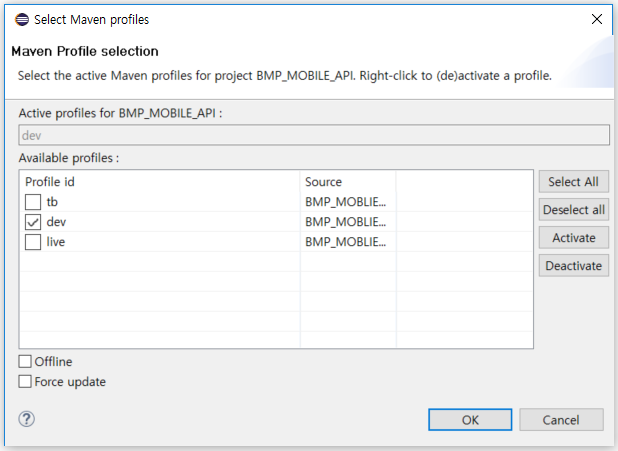Maven Build 시 test 건너뛰기
Maven Build (install) 시 Maven Test 이후에 Build를 하게 된다.
이때 jUnit 테스트 에서 Exception 발생 및 Assert not Equal 등으로 Test가 실패할 경우 Build 는 실패 (Fail) 하게 된다.
jUnit Test 가 실패해도 Build 는 되게끔 Maven Test 단계를 건너뛰는 방법은 아래와 같다.
1. CMD 에서 빌드시
mvn install -DskipTests
2. IDE Run configurations 에서 빌드시
1. Goals 에 다음과 같이 옵션 부여 : install -DskipTests
2. Skip Tests 체크박스 체크 후 run
3. pom 수정 : surefire plugin 사용 (skipTests 속성 값 true/false 로 지정)
|
1
2
3
4
5
6
7
8
|
<plugin>
<groupId>org.apache.maven.plugins</groupId>
<artifactId>maven-surefire-plugin</artifactId>
<version>3.0.0-M4</version>
<configuration>
<skipTests>true</skipTests>
</configuration>
</plugin>
|
cs |
surefire doc:
https://maven.apache.org/surefire/maven-surefire-plugin/examples/skipping-tests.html
'back > Spring Framework' 카테고리의 다른 글
| [Spring Fw] inter-bean reference vs. Bean Lite Mode : @Configuration 어노테이션 없이 @Bean 사용 (0) | 2020.05.09 |
|---|---|
| [Spring Fw] application context vs. servlet context (0) | 2020.05.07 |
| [Spring Batch+Quartz] 스프링 배치, 쿼츠 메타테이블 들여다보기 (1) | 2020.04.21 |
| [Spring Batch+Quartz] 스프링 배치+쿼츠 설정 및 구현 Clustering 모드 사용 (3) | 2020.04.20 |
| @Transactional Propagation (전파속성), Isolation (격리수준레벨) 그리고 synchronized (0) | 2020.04.17 |




